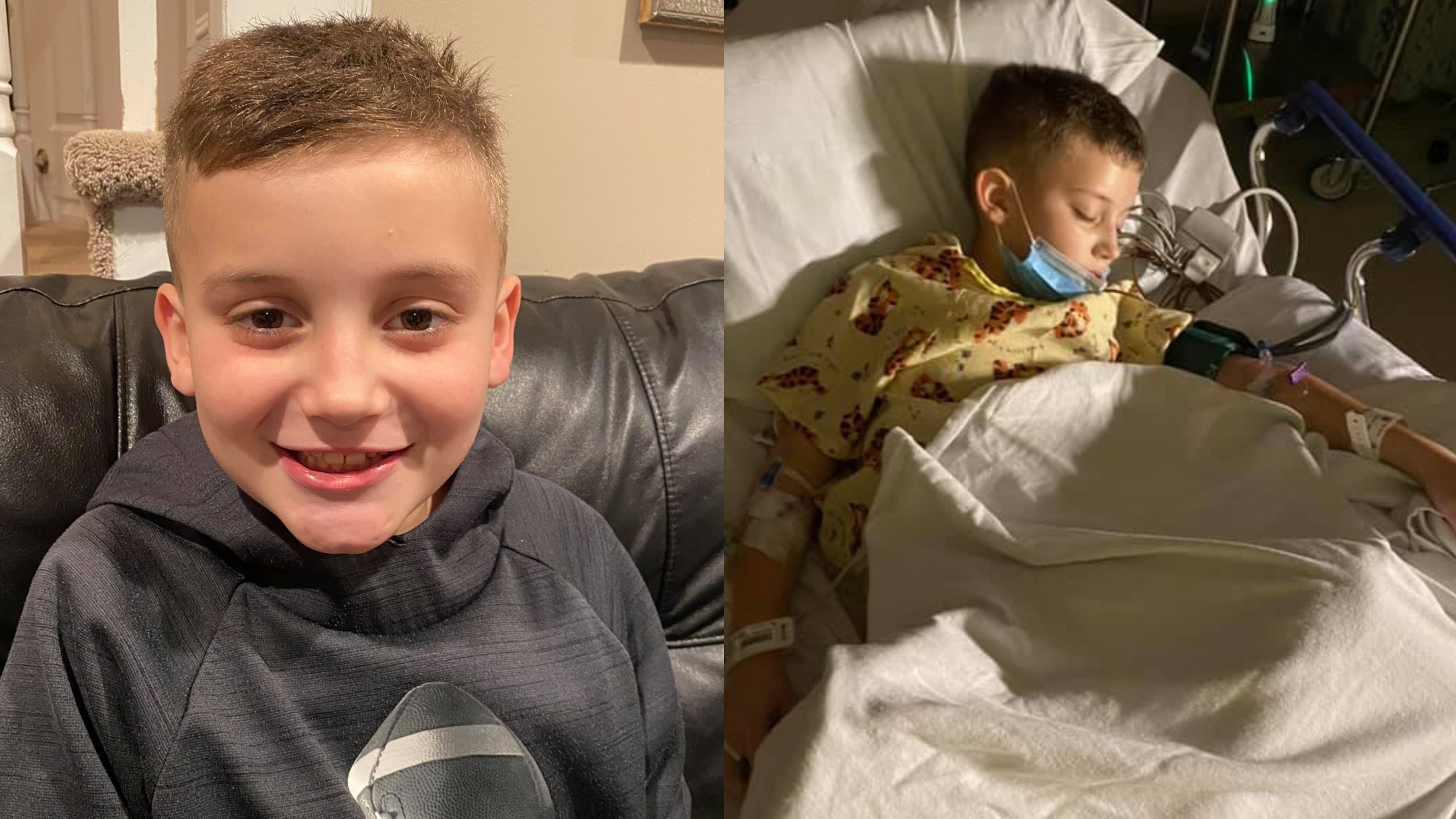
When 9-year-old Joey Pellegrini tested positive for COVID-19 back in October, his mom Jane was concerned, but not overly worried. The Fremont, New Hampshire, mom knew that kids often fare better from the virus than adults, and was thankful that Joey's symptoms were mild. In fact, he was well enough to return to school within just two weeks, after he once again tested negative. But what Jane wasn't prepared for was the sharp decline her son's health would take just weeks after he allegedly shed the virus. That was when doctors discovered little Joey had developed MIS-C — a rare but serious condition in children that is believed to be triggered by COVID-19. And before she knew it, Jane was watching her son fight for his life.
When Joey first "recovered" from the virus, Jane felt a rush of relief
"All of his symptoms were over, the head cold had gone," she recently told Today. "We thought, 'No big deal. COVID wasn't that scary after all.' And that was it."
But unfortunately, that wasn't it. Not by a long shot.
Joey started feeling sick again on October 29
According to Pellegrini, she assumed it was a stomach bug, based on his symptoms. After all, her son had just returned to school after his bout with COVID, and stomach bugs are pretty common among 9-year-olds.
But as Joey's fever began to rise, Jane started to wonder if maybe something else was at play.
A few days later, Joey's worsening symptoms became impossible to ignore
By then, it was Halloween — every kid's favorite holiday — and poor Joey was stuck in bed, barely able to move. Suddenly, his heart began beating out of his chest too, and his whole body felt like it was vibrating.
"I went and got my Apple Watch and put it on his wrist," Jane recently told the outlet. "He had a really high heart rate of, like, 155 beats per minute."
The mother's first call was to the pediatrician, which she soon learned was all booked up. Next, she rang up all her local urgent care centers, but they too were strapped for openings.
Finally, she found one with an open appointment — but only for later that night.
So, Jane waited patiently ...
That evening, she told her husband to take the other kids trick-or-treating and raced her son to urgent care. But if she thought they'd only be out a couple of hours, she was sadly mistaken.
The doctor at urgent care became concerned about Joey's EKG results and sent them on to a local hospital. There, the 9-year-old was subjected to even more tests, which confirmed that Joey was battling something much more serious.
The mother and son were sent via ambulance to Massachusetts General Hospital in Boston, which is located just about an hour from their home in New Hampshire.
For more than six hours, Joey and his mother had to wait for a room in the PICU
When they finally got one, Joey was put through nearly every test imaginable.
"They had him hooked up to all the monitors, they had his IVs going," Jane recalled. "From that point on, he spent three days in intensive care and then two days on the regular pediatric floor before we were released."
Eventually, they got their diagnosis.
It was MIS-C, or multisystem inflammatory syndrome in children — a rare but serious medical condition wherein many of the body's organs become suddenly inflamed. It's been reported in well over 5,500 children throughout the US since the pandemic first began and has led to 48 deaths as of November. While doctors are still unclear as to what exactly causes the condition, all of the cases reported so far have occurred in children who have either had COVID-19 and were thought to have recovered, or were exposed to the virus through a close family member or friend.
As part of his treatment, Joey was treated intravenously with a slew of medications
They included immune globulin (which is a type of blood-derived antibody treatment), steroids, blood pressure medication, and intravenous fluids.
Doctors also performed echocardiograms on the boy to monitor Joey's heart rate throughout his stay.
9 y.o. Joey Pellegrini from Fremont #NewHampshire contracted mild COVID in early October, but two weeks later became severely ill from multi-system inflammatory syndrome. He had a high fever, abdominal pain and very low blood pressure. #TheySurvivedCovid https://t.co/0SaMCw8zZz pic.twitter.com/gy91kzsQ4J
— Cleavon MD (@Cleavon_MD) November 27, 2021
In the end, Joey spent a total of five days in the hospital after his MIS-C diagnosis before he was finally allowed to return home.
Now Jane feels beyond lucky to have her son back
But even though Joey is home, he's still in recovery mode.
"His cardiologist cleared him to return to school as long as he is ready — with limited activity," Jane shared, adding that his energy levels are low. "He will not be able to do gym class, no running around at recess."
In the meantime, Jane is caring for her son at home while also trying to warn other parents, who may not be familiar with the symptoms of MIS-C, just as she wasn't.
"I was completely unaware of this MIS-C," Jane admitted to Today. "I had no idea to even look for symptoms. If I had any knowledge of this, I would have brought him in at the first signs of the stomach bug."
According to experts, it's not really a surprise that Jane Pellegrini was confused at first
Dr. Sandy Hong, a pediatric rheumatologist and clinical professor of pediatrics at the University of Iowa, told Today that many of the condition's initial symptoms look pretty similar to some sort of gastrointestinal issue.
In fact, most kids start off with things like diarrhea, vomiting, loss of appetite, abdominal pain, and a persistent fever that lasts for a few weeks. But because we're so conditioned to thinking about COVID as more of a sore throat and loss of smell thing, it seems that many parents are overlooking a few pretty obvious warning signs of MIS-C.
No one is immune to COVID-19 and it’s severe outcomes, including children. Over 25% of COVID-19 infections in Louisiana have been in children, resulting in 18 deaths and over 275 cases of Multisystem Inflammatory Syndrome in Children (MIS-C). pic.twitter.com/1cN15r0oTN
— Louisiana Department of Health (@LADeptHealth) December 6, 2021
According to Hong, the symptoms crop up roughly three to six weeks after COVID-19 goes away, and they appear to be considerably more intense.
"About half of them present in shock and need to be in the intensive care unit," explained Hong.
Of course, MIS-C is still considered rare
But as Jane herself has said to others, "It may be rare, but it’s VERY REAL" to the families affected by it.
Doctors are also unsure whether the recent uptick in pediatric COVID cases could lead to a rise in MIS-C cases in the months ahead, which would be concerning. That's why health experts are stressing the importance of vaccinating children — especially now that the FDA has approved the shot for kids ages 5 and up.
"If they're fully vaccinated, they won't get [severe] COVID. So therefore, by definition, they should not get MIS-C either," Dr. Diana Bianchi, director of the Eunice Kennedy Shriver National Institute of Child Health and Human Development, told Today. "So if you're a parent and you're terrified about your child getting MIS-C, you can do something about it."




